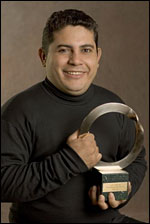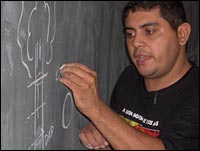In the northern Brazilian state of Pará, where the mouth of the Amazon cuts into the continent, illegal logging, industrial farming, and a human-driven cycle of massive wildfires are destroying the tropical forests. Since he was a teenager, Tarcísio Feitosa da Silva has considered it his mission to help protect these forests, and the isolated communities that live within them.

Tarcísio Feitosa da Silva.
Photo: Goldman Environmental Prize.
Feitosa works in the Xingu and Middle Lands of Pará, some of the most remote areas of the Amazon basin. He is one of the leaders of the Movement for the Development of the Transamazon and the Xingu — a coalition of grassroots agriculture and sustainable-development groups — and he works with the country’s National Conference of Bishops on social-justice issues.
Though several of his fellow activists have been assassinated because of their efforts, Feitosa continues to work with local communities and other allies to document and protest illegal logging activities. His work helped convince the government to establish a mosaic of parks and reserves in the region, which — when combined with existing indigenous landholdings — cover nearly 100,000 square miles, the world’s largest area of protected tropical forest.
Feitosa, 35, was awarded one of six 2006 Goldman Environmental Prizes at a ceremony in San Francisco on April 24. He spoke to Grist through a translator.
What are the most serious threats to the land and people in the area where you work?
There is a lot of illegal logging, and a lot of big cattle ranchers are coming in. The soybean farmers are destroying the forest, and turning it into what we call a big, green desert. Also, the government has just announced a cooperative agreement with an aluminum company to build five dams in the region.
How did you come to work in Pará?
I was born and raised in this area, and I went to school in this area. I started working with the indigenous people when I was about 15 years old. I couldn’t go where the Indians were — because I was so young — but between the ages of 15 and 18 I helped them when they came to the city. I helped them look for medical assistance, and I went with them to meet government officials.
When I turned 18, I began to visit these communities constantly. Some of them are three to four days’ travel away from the city. In some areas, I helped them mark the land so that they know which piece of land belongs to them. In 2001 and 2002, I went to investigate the illegal logging that was happening inside the Indians’ land, in a place we call the Middle Lands — that’s the area between the Xingu River and the Iriri River. In the last four years, I have been working with rubber-tappers and other people who live next to the river. They are also defending their forest against land grabs.
What made you decide to dedicate your time and energy to the region?
I’m a Christian, and I believe we have a mission to work for the protection of the forest, and in the defense of the population that lives there. I come from a Christian community, and we preach respect for the Indian populations, respect for the small farmers and the other people who live close to the river. They are able to live in harmony with the forest.
What do you consider your greatest victories?
In this moment, we’re able to protect an area that represents 55 percent of the region. This is the work of many organizations, which include workers, laborers, fishers, and rubber-tappers. These people have found, in this network of institutions, support to defend their area of use in the forest.
What gives you the courage to continue in the face of enormous personal risks?
I believe that you can have an Amazon with justice and peace. Many of my companions have been assassinated, and in memory of these companions, I continue my work.
How can environmentalists in industrialized countries like the U.S. help your cause?

Spreading the gospel of sustainable forest practices.
Photo: John Antonelli.
It’s very important to know that the market has a big influence on the preservation of the Amazon. To buy wood that has been illegally logged, to buy soybeans raised and cultivated in the Amazon — if people would stop buying these things, we could save the forest, and we could save the Amazon.
What does this prize mean to you?
For me, it means the recognition not of my own struggle, but of a network of companions who continue fighting for the preservation of the forest. It’s also a sign of respect for the population that lives there.
What do you plan to do with the money?
I want to go back to school, I want to guarantee school for my kids, and I want to help the communities in the region where I work. I didn’t have a chance to go to [university], and today I feel the need to know more. I want to study economics and the environment — I want to understand the relationships between markets, and how they can help keep the forest the way it’s supposed to be. I want to apply this knowledge in the communities where I work, because I believe it could be a great asset for them.

